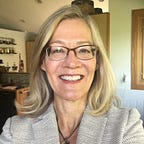Is it even possible to talk about our stark differences? It is, and it can do a lot of good.
With a new president calling for national unity, our country is enjoying a moment of relative calm, but I think most of us would agree that the beast of civic discord is still with us. This month, I am preparing my college first year seminar, Dialogue in a Polarized Age, in one of the most divided social climates I have seen in my 15 years of teaching the course. Along with many Americans, my students may be wondering what possible good sitting down to talk can do now.
A lot, actually.
For many, disagreement is a dirty word. It’s either something we would do anything to avoid (at least when we’re face-to-face) or, as President Joe Biden said in his inaugural address, something that we too often see as a cause for total war. But disagreement is so important to our form of government that presidential historian Jon Meachum calls it democracy’s oxygen.
We find ourselves belonging to factions that don’t like or trust one another, but we don’t really know one another. We understand too little about who people are and what motivates them. What they read. How they worship. What their working lives are really like. Dialogue, a skill anyone can learn, is a way for us to learn the truth about one another, person to person.
It’s easy to criticize such an innocuous-seeming practice. A friend of mine observes that most people who engage in dialogue already agree with one another. Getting true rivals to the table is a challenge that dialogue professionals like my friend Bob Stains, from Essential Partners, says he and others struggle with.
Among my students, another criticism is that sitting in a circle and granting equal time to all participants’ perspectives risks promoting a false equivalence of positions on issues that for some people feels truly threatening. One semester, a student refused to engage on the subject of LGBTQ rights with an openly gay student in class because it went against her Christian beliefs. Another semester, an LGBTQ student refused to discuss the subject of marriage equality with a class member who held an opposing viewpoint. As Stains put it, “One person’s truth is another person’s trauma.”
Not everyone is ready for dialogue across differences. Then again, no one asks them to be. Aspiring to the democratic ideal of unity as Americans despite our differences should be expected of people, as commonplace as voting or performing routine maintenance on your vehicle.
Unity isn’t sameness or agreement; it is a complex whole. Public dialogue can help to maintain that whole, and usually it’s far from unpleasant. For one thing, you get to be the center of attention — truly heard — as you share your story and what things are important to you. For another, it helps you clarify your thinking. The student who was adamantly opposed to gay marriage actually didn’t know why he felt that way. This unnerved him, so stayed up late one night to write out his reasoning. I wouldn’t be surprised if one day he used a similar process to explain why he changed his mind.
I’m not naïve. I realize no QAnon believer who wants to “own the libs” is going to sit down with a Democrat any time soon (or vice versa). But public dialogue is less about offering a solution to our divisions than a practice designed to help prevent them in the first place. Too often, we move straight to litigation simply because we’re offended, or we want to make an example of someone. We have to trust ourselves to resolve the smaller conflicts before bigger conflicts are allowed to flourish.
There is vast real estate between the start of a misunderstanding and the no man’s land of seething online networks. And we don’t have to outsource that territory to experts. In our communities we are the experts. Opportunities for dialogue across difference happen regularly in central Iowa, with organizations like CultureALL, the Des Moines Civil and Human Rights Commission’s Bridging the Gap initiative, and the Fallon Forum’s new project, “52 Conversations with Iowa Trump Voters” to name just a few.
“The time for dialogue is over,” we hear so often. “Now is the time for action.” But dialogue is action, the action of strengthening bonds before they break. We won’t soon forget the image of insurrectionists breaching the Capitol and congressional chambers. But that doesn’t mean we retreat to our respective bubbles. A generation of young people is watching. Let’s show them that democracy is worth the risk.
Carol Spaulding-Kruse is a professor of English at Drake University. She is working on a book about public dialogue, “The Talking Cure: Why Dialogue Could Still Save Us.” Contact: Carol.spaulding@drake.edu.
Originally published at https://www.desmoinesregister.com.
